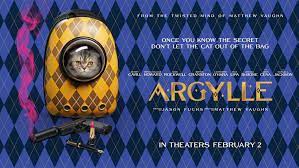“Argylle” (2024)
Action

Running Time: 139 minutes
Written by: Jason Fuchs
Directed by: Matthew Vaughn
Featuring: Bryce Dallas Howard, Sam Rockwell, Bryan Cranston, Catherine O’Hara, Henry Cavill, Sofia Boutella, Dua Lipa, Ariana DeBose, John Cena and Samuel L. Jackson
“Once you know the secret don’t let the cat out of the bag.”
Matthew Vaughn’s latest, “Argylle,” bursts onto the screen with a bang, a star-studded cast, and a frenetic energy that promises a wild ride. Does it deliver on that promise? It depends on your tolerance for stylistic excess and narrative detours.
The film centres on Elly Conway (Bryce Dallas Howard), a struggling novelist whose fictional spy capers seem ripped from reality. When her life collides with that of suave spy Argylle (Henry Cavill), the lines between fiction and reality blur, propelling them into a globe-trotting adventure riddled with assassins, double agents, and a shadowy organization pulling the strings.
Vaughn, known for his signature style, doesn’t disappoint. “Argylle” is visually stunning, boasting vibrant locales, meticulously choreographed action sequences, and a soundtrack that throbs with energy.
The meta-commentary in “Argylle” is a double-edged sword. While it adds humour, complexity, and postmodern playfulness, it can also be unevenly executed, potentially alienating some viewers and hindering emotional engagement. Ultimately, its effectiveness depends on individual preferences and expectations.
Strengths of the Meta-Commentary: Self-aware humour: The film playfully acknowledges and even mocks common spy tropes, creating a sense of humour and self-awareness that elevates the genre; Commentary on authorship and reality: Elly’s experience of her fictional world bleeding into reality prompts viewers to question the blurring lines between fiction and truth; Postmodern playfulness: The film’s meta-narrative adds a layer of complexity and encourages active audience engagement.
Weaknesses of the Meta-Commentary:
Uneven execution: The meta-commentary can be heavy-handed at times, potentially distracting from the main narrative; Accessibility: Not all viewers may appreciate or fully understand the meta-references and self-aware humour; Risk of undermining emotional impact: The focus on meta-commentary can sometimes distance the audience from the characters and their emotional journeys.
Characters:
Elly Conway: A novelist whose fictional spy world collides with reality, mirroring the film’s meta-narrative. Bryce Dallas Howard delivers a compelling performance, showcasing Elly’s vulnerability and struggle for self-discovery. However, her character arc feels incomplete,leaving questions about her agency and future.
Argylle: The enigmatic spy shrouded in mystery. Henry Cavill portrays him with charisma,but the character lacks depth and nuance. His motivations remain murky, hindering emotional engagement.
Aidan: Sam Rockwell shines as the eccentric tech billionaire, providing much-needed humor and unpredictability. However, his role feels underdeveloped, and his potential for further exploration is untapped.
Supporting Cast: John Cena offers a nuanced performance, but his character is underutilized. Dua Lipa’s cameo is memorable, but limited. Catherine O’Hara primarily functions as a plot device.
Action Sequences:
A Visual Feast: Director Matthew Vaughn delivers his signature stylish flair, with meticulously choreographed fight sequences and vibrant locations. The action is technically impressive, but can feel overwhelming at times.
Narrative Integration: While some sequences effectively advance the plot and reveal character traits (e.g., Elly’s resourcefulness), others feel like disconnected set pieces lacking emotional weight.
Genre Comparisons: Compared to other spy films, the action is more fantastical and self-aware, reflecting the meta-commentary. However, it lacks the visceral intensity found in films like “John Wick” or the grounded realism of “Mission: Impossible.”
Meta-Commentary:
Playful Self-Awareness: The film playfully mocks spy tropes and conventions, providing humor and encouraging active audience engagement. This resonates with viewers who appreciate meta-narratives and genre deconstruction.
Uneven Execution: The self-referential humour can be hit-or-miss, occasionally distracting from the emotional core of the story. Some viewers might find it excessive or unnecessary.
Blurring Lines: The meta-commentary blurs the lines between fiction and reality, mirroring Elly’s experience and inviting exploration of authorship and truth. However, this approach can alienate viewers seeking a straightforward narrative without self-conscious commentary.
Argylle is a visually stylish and entertaining film with flashes of brilliance, but ultimately hampered by a convoluted plot, uneven pacing, and underdeveloped characters. If you’re looking for a visually stunning, action-packed spy romp with a light-hearted tone, Argylle might be worth a watch. However, if you crave a deeper story with well-developed characters, you might be left wanting more.






